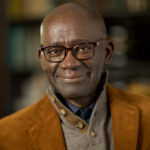“The big question is: is Western science as universalizable as Westerners say it is?”
– Mamadou Diouf
In collaboration with CIRCEM and AISLF, Jurivision presents a series of interviews conducted as part of the XXIIᵉ Congrès international des sociologues de langue française. Entitled “Sciences, Savoirs et Sociétés”, the Congress brought together over a thousand francophone and francophile scientists at the University of Ottawa in July 2024.
In this post, Professor Mamadou Diouf compares Western history with history as thought and recorded by African societies. He explains the distinctions between orality and the principle of archiving, and discusses the impact of colonization on the production of knowledge in Africa. He challenges the universality of Western science and highlights some of the characteristics of African science, including the importance of practice and problem-solving.
Mamadou Diouf talks more about African science and history in the episode Sciences, savoirs et sociétés (Part 6): Enjeux et défis scientifiques contemporains of the CIRCEM podcasts.

